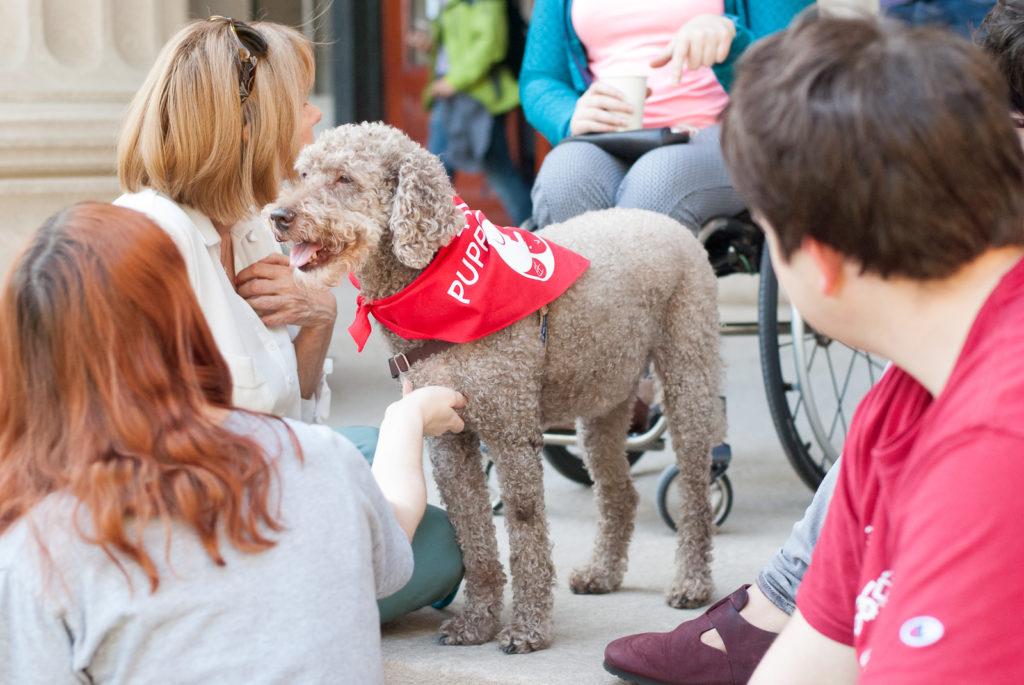By Catherine Lindsay, news correspondent
The Massachusetts Institute of Technology (MIT) Puppy Lab aims to combat rising stress levels due to final exams in the month of May.
The Puppy Lab offers therapy dogs for students to pet for relief. Stephanie Ku, a 24-year-old MIT-Harvard graduate student researching health sciences and technology, created the Puppy Lab because she believes that interactions with animals can improve one’s state of mental health and wellness.
Four Puppy Lab events were organized on May 10, 11, 17 and 18, between 3 and 5 p.m. in the Lobby 10 Community Lounge on the MIT campus. During the two-hour window, Ku estimates that approximately 100 people went to pet the three to six dogs present.
“It was an unexpected and overwhelming success, especially during the first two dates,” said Ku. “I only received positive feedback and people wanting to get involved.”
The project received a $1,000 grant from the MIT MindHandHeart Innovation Fund in the fall of 2015, after Ku submitted her proposal for the Puppy Lab in October. The funds were used to organize Puppy Lab events.
All selected dogs had to go through a certification workshop to become members of the therapy dog organization Dogs Building Opportunities for Nurturing and Emotional Support (Dog B.O.N.E.S), whose mission is to train and provide therapy dogs for various events.
Each workshop consisted of two-and-a-half-hour sessions where dogs participated in a temperamental and behavioral evaluation as well as an introduction to scenarios that may be experienced during the events. They also learned basic obedience commands. Ku said that the workshop went well for all eight dogs that completed it.
Ku said her involvement with this project had nothing to do with her coursework. Inspiration for the Puppy Lab came when Ku got her own rescue puppy, Wingnut, a year ago.
“I would always meet dog lovers in the street and saw how happy she [Wingnut] made people,” Ku said. “The sight of an animal really changes how people feel that day and I wanted a venue to share that feeling with others.”
Alicia Lai, a 19-year-old sophomore brain and cognitive sciences major at MIT, attended the first official Puppy Lab event. She believes the lab is very effective in helping students deal with stress.
“It was definitely very therapeutic to play with the puppies,” she said. “It’s an experience that is different from human interaction, and is definitely very stress-relieving.”
Lai said she hopes to see the lab continue. Although MIT has held therapy dog events before, they have been random and the Puppy Lab provided regularity in terms of days and times that other events have not, she said.
The Puppy Lab also coincided with National Mental Health Awareness Month, a month dedicated to discussing and reducing the stigmas of mental health. Ku is interested in the effect her project could have on improving students’ mental health.
“Having had interactions with people with many of these concerns, stress levels and anxiety, I definitely am grateful that I was able to contribute in a positive way and address this issue,” she said.
MIT also held a number of other dog-petting events such as Furry First Friday, Cookies with Canines and Yappy Hour, as well as stress-relieving events as part of its #MentalHealthMay calendar.
Northeastern University has also held therapy dog events on campus during Mental Health Awareness Week in October and finals weeks. This year however, Active Minds, the mental health awareness organization that usually plans these events, was unable to do so, according to Active Minds advocacy chair Anthony Formicola.
“In both instances, the company we had a previous connection with, [Therapy Dogs International] TDI, was unable to commit enough dogs to the days that we had scheduled,” he said.
TDI has volunteer dogs and handlers in all 50 states and as of 2012, 24,750 dog and handler teams were registered.
Formicola added that, although they were unable to plan these events this year, Active Minds is very determined to make this a reality next year on the Northeastern campus.
At MIT, before Ku began her project, she sent out a survey to the undergraduate MIT community to assess their stress levels. Now she plans to collect project-evaluation data so that she may continue this lab as a series.
“I would like to make a program that lasts,” Ku said. “I have a small group of volunteers who are enthusiastic about helping and ultimately I would like to consolidate all the therapy dog events on campus.”
Photo courtesy Stephanie Ku















